New political controversy… Lebanese government holds fourth “relief” session

In the face of continuing debate over its constitutionality, the Lebanese government, headed by Najib Mikati, held a fourth cabinet session to pass some of the files.
The session, at which two-thirds of the members of the 24-member Council of Ministers attended, was held at the Grand Serail, the seat of government in Beirut. It was the fourth session of the Council of Ministers with presidential powers since the October 31st presidential vacuum.
Deputy Prime Minister Saadeh Al Shami participated in the cabinet session, Finance Minister Youssef Khalil, Minister of Public Works and Transport Ali Hamiyah, Youth and Sports George Kallas, Agriculture Abbas Hajj Hassan, Administrative Development Affairs Najla Al-Riyashi, Health Firas Al-Abyad, Economy and Trade Amin Salam, Interior and Municipalities Judge Bassam Mawlawi, Media Ziad Makari, Education Judge Abbas Al-Halabi, Communications Johnny Al-Qarm, Industry George Bushkian, Work Mustafa Bayram, and Tourism Walid Nassar.
Management of affairs
Prime Minister Najib Mikati said at the outset of the cabinet session, “Our presence today at this session is to manage the urgent affairs of citizens, to keep public facilities running and to affirm that we are concerned with every Lebanese, with his dignity, security and stability.”
“Priority remains for the election of the president of the republic, given that this election is the key to restoring the regularity of public work, especially in these difficult circumstances, and giving the country a grace period to re-energize it,” he said.
Mikati said he met this week with Total, which confirmed that its work is on schedule and that it is in the process of beginning all necessary tests to begin the extraction process.
Agenda
The agenda for which the session was held includes considering the Minister of Finance’s request to approve the collection of imports and disbursement of expenditures on the basis of the 12-year rule, starting from the beginning of this February until the issuance of the 2023 budget law, which was not drafted in the first place.
It also includes a request from the Higher Relief Council to complete the survey of broken down and uninhabitable buildings as a result of the earthquake or natural factors by the municipalities, and to secure an advance of 100 billion Lebanese pounds instead of accommodation for the units recommended by the inspection committees to be evacuated. The shelter allowance will be set at 30 million Lebanese pounds for a period of three months.
Sharp division
The government’s announcement of the hearings was followed by a sharp division over the Mikati government’s authority to hold a session to exercise the powers of the president.
The Free Patriotic Movement (Aoun’s political team and the second-largest Christian bloc in parliament) believes that holding cabinet meetings after the government’s resignation is illegitimate; They only exercise their powers in the framework of the conduct of business and are not entitled to exercise higher powers.
The other group believes that the government has the right to hold meetings to manage the work of the state and citizens, not to enter into new constitutional crises, and to maintain stability in a complex and dangerous stage economically, financially and socially.












